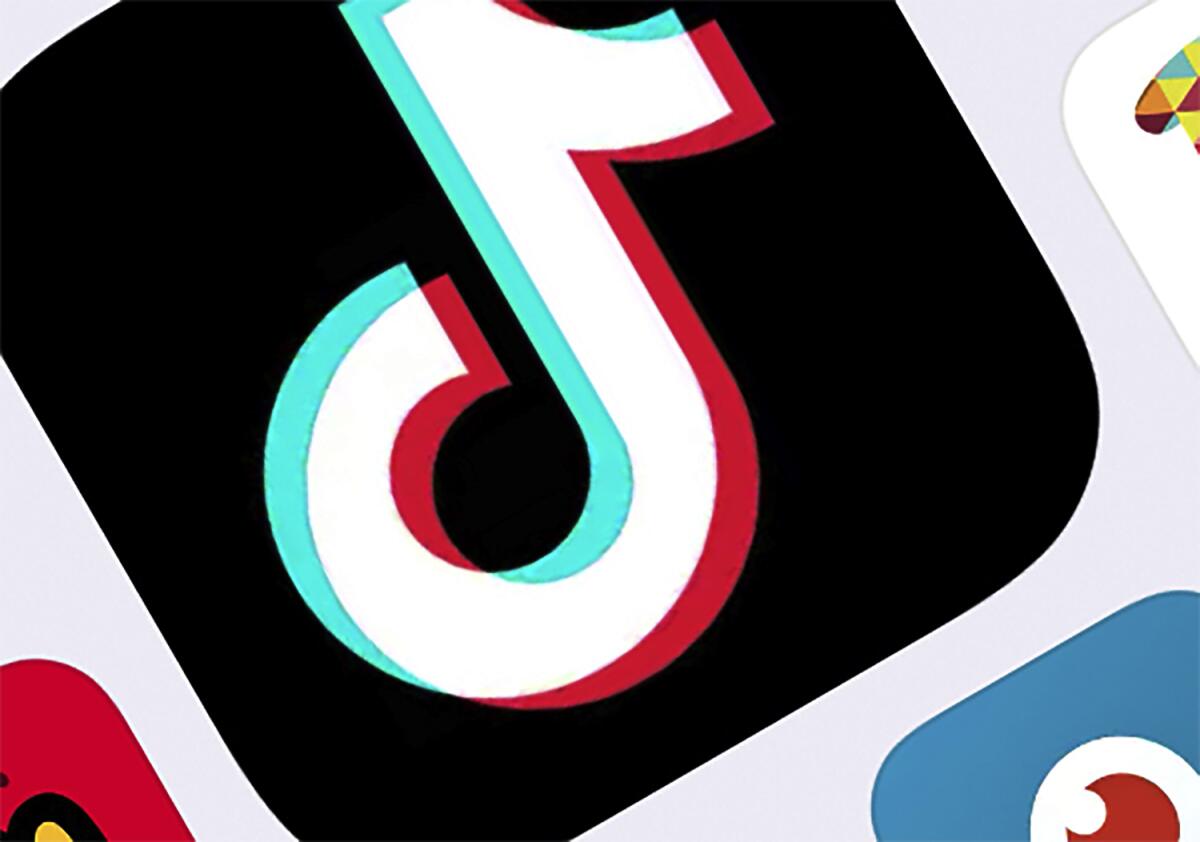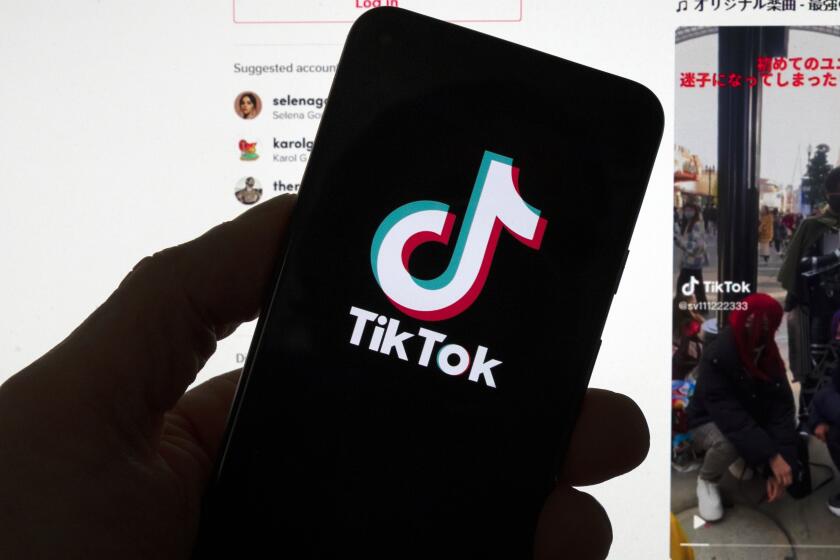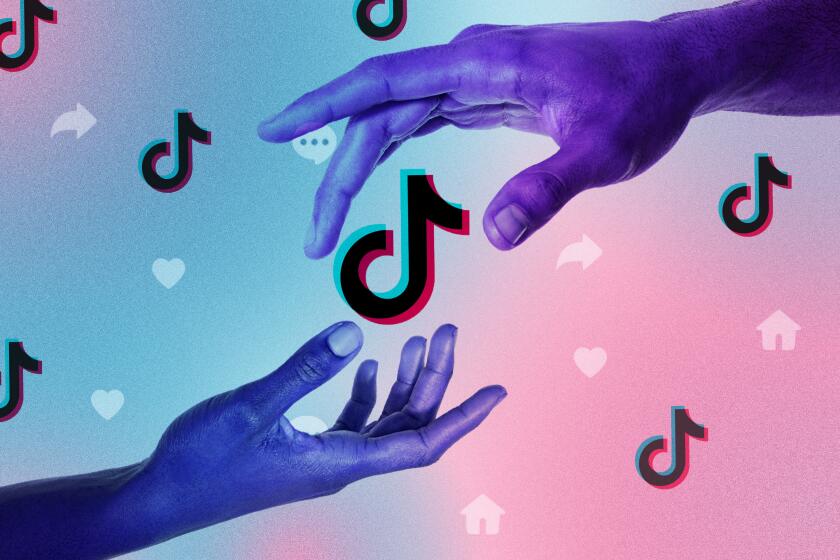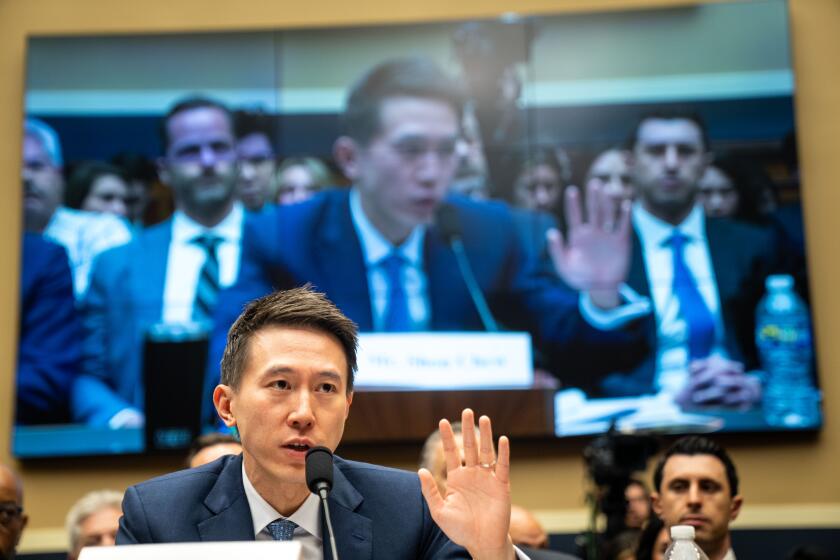I’m 63 and I don’t want to lose my TikTok

- Share via
I am an unlikely convert to TikTok. Now I can’t imagine giving it up.
When I first downloaded the app in the middle of the pandemic, I looked at #BookTok accounts to see which titles people recommended. Then I strayed into makeup tutorials for women over 60 — just in time for all those new Zoom business calls. I learned about contouring my face to make it shapelier but never mastered the smokey eye.
I had a slight flirtation with #GRWMs, “get ready with me” posts showing young women prepping for their days. And I loved seeing videos about apartments for rent in New York.
My participation was an anomaly. Most TikTok obsessives are 18 to 24 years old. Only 1.7% of the users are my age — above 55.
Despite Biden’s recent threat to the Chinese-owned app, a national ban is unlikely, and a forced sale would get messy.
I was a lurker, though, not a creator, and it never occurred to me to try to make a profit from the site. What I gained instead in the middle of the lockdown was a feeling of connection. The one-to-three-minute videos, set to catchy music, were so compelling I wanted to know more about the creators.
Within a few months, my relationship to TikTok deepened, a development that flabbergasted most of my friends. TikTok’s algorithm began to send me videos that revealed lives quite foreign from my own. @TheKathyProject showed me a family coping with a sister fading from early onset Alzheimer’s. I watched her adjust to her new life in a nursing home. @Roseinchina1 showed the life of a Ugandan woman married to a Chinese man in a rural village in eastern China’s Zhejiang province. The food Rose cooks looks extraordinary. @StuartandFrancis, a gay couple in the U.K., have a son, Rio, born through a surrogate. Another child is on the way.
It was those videos that got me hooked — and showed me how TikTok, often dismissed as just a place for teenagers to post dance videos, could also be a mechanism to build empathy.
One of the most meaningful “connections” I formed was with @DylanMulvaney, a gay actor who transitioned to female in March 2022. Mulvaney created a series, “Days of Girlhood,” in which she shared her journey as a woman with all its successes and tribulations. Viewers saw her delight in dressing in feminine clothes and frustration at not being able to shave after a laser hair removal procedure.
Is America a freer place with TikTok, or without it?
Mulvaney transitioned during an unprecedented period of anti-trans activism. At the end of March, the think tank Movement Advancement Project counted 650 anti-LGBTQ bills making their way through various legislatures. While I know a few trans people, I don’t know them well. So normally this would be an issue I followed with concern, but with a sense of detachment. But watching Mulvaney, I realized the fight for trans rights is everyone’s fight. The loss of one civil right can lead to the loss of more civil rights.
Others are sympathetic to Mulvaney’s journey too. In the past year, her account has gone from 1 million to 10 million followers. She has become a potent influencer. President Biden invited her to the White House. She was a guest on “The Drew Barrymore Show.” Her special at the Rainbow Room in New York City to mark the one-year anniversary of her transition was so popular that the livestream crashed. Naturally, those opposed to LGBTQ rights have attacked and criticized her.
Accounts like Mulvaney’s are why the threats to ban TikTok concern me. It would isolate me and other users from different viewpoints. Members of Congress are concerned that China-based ByteDance, which owns TikTok, could be pressured by the Chinese government to turn over the private data of TikTok’s 150 million active U.S. users. And could feed them misinformation. It’s a valid concern.
But how do the risks of TikTok measure up against the risks posed by Meta and Google and other social media sites? Those apps track my movements, know what I browse, and sell that data to personalize the ads I get. In 2014, Cambridge Analytica, a British political consulting firm, illegally harvested data from 50 million Facebook accounts and used them to try to manipulate elections in the U.S. and the U.K.
Concerns about users’ privacy, disinformation and impacts on children are not unique to TikTok.
And Twitter under Elon Musk has stripped away that site’s safeguards, leaving users exposed to constant abuse, racial slurs and misinformation. Now the blue check that verified users, me included, is gone.
Congress needs to examine the pitfalls of every social media platform and set up safeguards that protect users from abuses from Facebook, Twitter, WhatsApp, Instagram — not just TikTok.
At its best, TikTok can build empathy. And in our fractured, politically divided world, we need all the understanding we can get.
Let’s fix it, not ban it.
Frances Dinkelspiel is an author, journalist and co-founder of the nonprofit news organization Cityside, with sites in Berkeley and Oakland.
More to Read
A cure for the common opinion
Get thought-provoking perspectives with our weekly newsletter.
You may occasionally receive promotional content from the Los Angeles Times.









